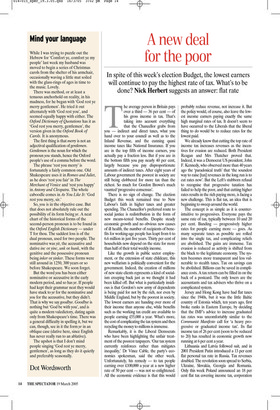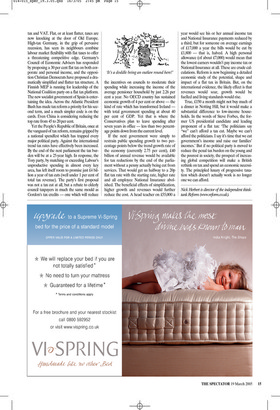A new deal for the poor
In spite of this week’s election Budget, the lowest earners will continue to pay the highest rate of tax. What’s to be done? Nick Herbert suggests an answer: flat rate The average person in Britain pays over a third — 36 per cent — of his gross income in tax. That’s taking into account everything that the Chancellor grabs from you — indirect and direct taxes, what you hand over to your council as well as to the Inland Revenue, and the cunning quasi income taxes like National Insurance. If you are in the top fifth of income earners, you actually pay a fraction less. But if you are in the bottom fifth you pay nearly 40 per cent, largely because you pay disproportionate amounts of indirect taxes. After eight years of Labour government the poorest in society are still being clobbered for more tax than the richest. So much for Gordon Brown’s much vaunted ‘progressive consensus’.
There is no sign of change. The election Budget this week remained true to New Labour’s faith in higher taxes and greater spending. The Chancellor’s preferred route to social justice is redistribution in the form of new means-tested benefits. Despite steady economic growth and no obvious new causes of ill health, the number of recipients of benefits for working-age people has leapt from 6 to 6.6 million in just five years. Thirty per cent of households now depend on the state for more than half of their total weekly income.
Like the growth in public sector employment, or the extension of state childcare, this new welfarism is politically convenient for the government. Indeed, the creation of millions of new state clients represents a kind of socialism creeping back just as we thought it had been killed off. But what is particularly insidious is that Gordon’s new army of dependents is being paid for not by the rich, nor even by Middle England, but by the poorest in society. The lowest earners are handing over more of their income than anyone else, while benefits such as the working tax credit are available to people earning £55,000 a year. What’s more, the cost of complicating the tax system and then recycling the money to millions is immense.
Remarkably, it is the Liberal Democrats who have been highlighting the unfair treatment of the poorest taxpayers. ‘Our tax system currently reinforces rather than mitigates inequality,’ Dr Vince Cable, the party’s economics spokesman, said the other week. Unfortunately, his remedy — to tax people earning over £100,000 a year at a new higher rate of 50 per cent — was not so enlightened. All the economic evidence is that this would probably reduce revenue, not increase it. But the policy would, of course, also leave the lowest income earners paying exactly the same high marginal rates of tax. It doesn’t seem to have occurred to the Liberals that the liberal thing to do would be to reduce rates for the lowest paid.
We already know that cutting the top rate of income tax increases revenues as the incentives for evasion are reduced. Both President Reagan and Mrs Thatcher proved that. Indeed, it was a Democrat US president, John F. Kennedy, who observed more than 40 years ago the ‘paradoxical truth’ that ‘the soundest way to raise [tax] revenues in the long run is to cut rates now’. But the Left’s stubborn refusal to recognise that progressive taxation has failed to help the poor, and that cutting higher rates results in the rich paying more, is facing a new challenge. This is flat tax, an idea that is beginning to sweep around the world.
The concept is as simple as it is counterintuitive to progressives. Everyone pays the same rate of tax, typically between 10 and 20 per cent. Banding — progressively higher rates for people earning more — goes. As many separate taxes as possible are rolled into the single tax, and complicating reliefs are abolished. The gains are immense. Tax evasion is reduced as activity is shifted from the black to the legitimate economy. The system becomes more transparent and less vulnerable to stealth taxes. Tax on savings can be abolished. Billions can be saved in compliance costs. A tax return can be filled in on the back of a postcard. The only losers are the accountants and tax advisers who thrive on a complicated system.
Jersey and Hong Kong have had flat taxes since the 1940s, but it was the little Baltic country of Estonia which, ten years ago, first broke ranks in Eastern Europe, by deciding that the IMF’s advice to increase graduated tax rates was uncomfortably similar to the Communist Manifesto call for ‘a heavy progressive or graduated income tax’. Its flat income tax of 26 per cent (soon to be reduced to 20) has resulted in economic growth now running at 6 per cent a year.
Lithuania and Latvia followed suit, and in 2001 President Putin introduced a 13 per cent flat personal tax rate in Russia. Tax revenues doubled. The revolution soon spread to Serbia, Ukraine, Slovakia, Georgia and Romania. Only this week Poland announced an 18 per cent flat tax covering income tax, corporation tax and VAT. Flat, or at least flatter, taxes are now knocking at the door of Old Europe. High-tax Germany, in the grip of pervasive recession, has seen its neighbours combine labour market flexibility with flat taxes to offer a threatening competitive edge. Germany’s Council of Economic Advisers has responded by proposing a 30 per cent flat tax on both corporate and personal income, and the opposition Christian Democrats have proposed a dramatically simplified and flatter tax structure. A Finnish MEP is running for leadership of the National Coalition party on a flat tax platform. The new socialist government of Spain is entertaining the idea. Across the Atlantic President Bush has made tax reform a priority for his second term, and a much simpler code is on the cards. Even China is considering reducing the top rate from 45 to 20 per cent.
Yet the People’s Republic of Britain, once at the vanguard of tax reform, remains gripped by a national spendfest which has trapped every major political party. Against the international trend tax rates have effectively been increased. By the end of the next parliament the tax burden will be at a 25-year high. In response, the Tory party, by matching or exceeding Labour’s unproductive spending in almost every key area, has left itself room to promise just £4 billion a year of tax cuts (well under 1 per cent of total tax revenue). The party’s first proposal was not a tax cut at all, but a rebate to elderly council taxpayers in much the same mould as Gordon’s tax credits — one which will reduce the incentives on councils to moderate their spending while increasing the income of the average pensioner household by just 2.26 per cent a year. No OECD country has sustained economic growth of 4 per cent or above — the kind of rate which has transformed Ireland with total government spending at about 40 per cent of GDP. Yet that is where the Conservatives plan to leave spending after seven years in office — less than two percentage points down from the current level.
If the next government were simply to restrain public spending growth to two percentage points below the trend growth rate of the economy (currently 2.75 per cent), £40 billion of annual revenue would be available for tax reductions by the end of the parliament without a penny actually being cut from services. That would get us halfway to a 20p flat tax rate with the starting rate, higher rate and all employee National Insurance abolished. The beneficial effects of simplification, higher growth and revenues would further reduce the cost. A head teacher on £55,000 a year would see his or her annual income tax and National Insurance payments reduced by a third, but for someone on average earnings of £17,000 a year the bills would be cut by £1,800 — that is, halved. A high personal allowance (of about £7,000) would mean that the lowest earners wouldn’t pay income tax or National Insurance at all. These are crude calculations. Reform is now beginning a detailed economic study of the potential, shape and impact of a flat tax in Britain. But, on the international evidence, the likely effect is that revenues would soar, growth would be fuelled and living standards would rise.
True, £150 a month might not buy much of a dinner in Notting Hill, but it would make a substantial difference to low-income households. In the words of Steve Forbes, the former US presidential candidate and leading proponent of a flat tax: ‘The politicians say “we” can’t afford a tax cut. Maybe we can’t afford the politicians. I say it’s time that we cut government’s income and raise our families’ incomes.’ But if no political party is moved to reduce the penal tax burden on the young and the poorest in society, the prospect of increasing global competition will make a British rethink on tax and spend an economic necessity. The principled luxury of progressive taxation which doesn’t actually work is no longer one we can afford.

















































 Previous page
Previous page